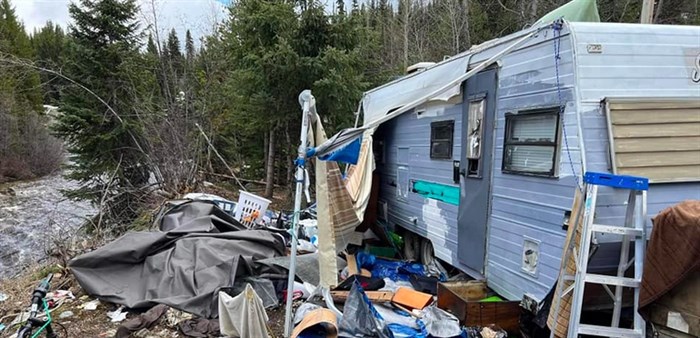
This campsite is just off the Big White Road and was the target of an Okanagan Forest Task Force cleanup effort.
Image Credit: SUBMITTED/Okanagan Forest Task Force
July 26, 2024 - 7:00 PM
In the thick of the housing and cost of living crisis there are people trying to make the best of it by camping out in the Okanagan's backcountry, but some say the danger and lack of social support make these encampments a problem.
Kane Blake is a founding member of the Okanagan Forest Task Force, a volunteer group dedicated to cleaning up the region’s backcountry including abandoned encampments.
“There's some people that are genuinely just down on their luck, and they're trying to make the best of it, but they're not making a mess. And then we have other ones that we’re having to bring dumpsters in after they leave,” Blake said.
The task force recently tackled an abandoned encampment near Okanagan Falls where they pulled 129,000 lb. of garbage out of the bush.
The mess is one thing but the fire risk during the summer, and encampment inaccessibility in case of an emergency, is another.
READ MORE: Kelowna forest clean up group removed 200K pounds of trash this year, launches new pollution reporting app
“Last year, when the fire came through Bartley Road. There were people in an encampment down there that barely made it out,” Blake said.
Recently there was fire at one of three encampments on Bartley Road.
“I don't know if he was cooking something or heating something up, but he went for a walk, and he came back to his camp fully engulfed in flames. He had to, on foot, run a kilometre up to a house to call 911 to have an emergency crew come and put out that fire,” he said.
The task force has dealt with 11 fires in backcountry encampments in the past two weeks, and when the backcountry is ignored it can become lawless.
“We were actually responding to a fire just the other night,” he said. “While we were dealing with that, there were gunshots in the background. To my knowledge, you are not allowed to discharge a firearm in the middle of the night. But people don’t care.”
Many people living rough in the backcountry might not have reliable transportation so it's difficult to access medical, addiction, mental health and emergency services.
“If something happens it could be days before somebody finds or sees them,” Blake said. “Do you want to be the bad guy for letting these people potentially, as bad as this is going to sound, get burned alive? Or do you want to be the bad guy for not letting them stay and not getting the help they need?”
He said people in the backcountry receive far fewer services in general than folks camped out in cities like those along the Okanagan Rail Trail in Kelowna.
“I don't see anything from the government happening. That's the problem,” he said. “Currently, what we have isn't working. Something needs to change. We're seeing more and more people trying to make the best of it in the backcountry than we ever have before.”
Backcountry camps are typically outside of a city’s boundary so they fall under the purview of the provincial Ministry of Housing. The provincial government has set up the Homeless Encampment Action Response Team, or HEART, to help provide unhoused people.
READ MORE: Kamloops man arrested for throwing rocks at kids in a playground
“Encampments are best resolved and prevented by offering people a pathway out of homelessness, which includes shelter, assessment and support to move to a range of housing options that best meet individual needs,” a ministry spokesperson said in an email.
Blake said the program is ineffective for helping folks living in the bush.
“They go approach these people and pretty much say, ‘hey, could you please leave,’ in a very nice way, and if they don't, they don't,” he said. “I just don't understand how we've gotten so soft. We have natural resource officers... their job used to be to make people move. Nobody’s doing it now.”
Blake said the two-week limit for camping on Crown land ought to be enforced, and if people are going to live out in the bush they should tell someone where they are in case of an emergency.
Everyone needs a place to go and live, but Blake said completely unregulated encampments in the backcountry are just too dangerous.
To contact a reporter for this story, email Jesse Tomas or call 250-488-3065 or email the editor. You can also submit photos, videos or news tips to the newsroom and be entered to win a monthly prize draw.
We welcome your comments and opinions on our stories but play nice. We won't censor or delete comments unless they contain off-topic statements or links, unnecessary vulgarity, false facts, spam or obviously fake profiles. If you have any concerns about what you see in comments, email the editor in the link above. SUBSCRIBE to our awesome newsletter here.
News from © iNFOnews, 2024